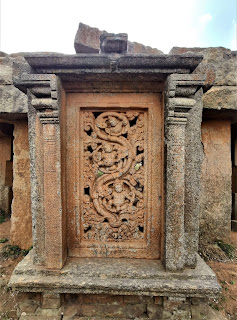KAMAKSHI KAPILESHWARA TEMPLE
Manne, Nelamangala
LOCATION
The temple which was once a place of worship and celebration now lies neglected in a small village called Manne in Nelamangala taluk. This place is approximately 40 kms away from the capital city of Karnataka, Bangalore. One can find it on the side of the main road that stretches from Muddalinganahalli railway station to Sirganahalli, in the outskirts of Nelamangala city This temple was constructed when the rulers of the Ganga’s lineage decided to shift its capital city from Kolar to Manyapura.
Manne or Manyapura which was the
capital of Western Gangas region became quite popular among the other states as
well. But later lost its claim to fame when the capital was again shifted to
Talakadu.
HISTORY
The Western Gangas
dominated most of the southern states in India from the 3rd century to the 10th
century. The main source of information about the ganga dynasty is obtained
from many carvings made on the walls of heritage sites in Mysore, Kolar, Ananthapura
and many other parts of Seemandhra. However, Chavundaraya purana written in Kannada
serves as the base to most of the tales of this age and place.
Since they ruled this
land for over 7 centuries, they played a crucial part in contributing to the
field of polity, literature, art, music. The laws made during this day are
still practised in many constitutions around the world, such is the impact on
the western civilization.
The structure is a
representation of Jainism culture that was practised here. The walls and roofs
consist of carvings of Parvathi and tirthankaras. goddess Parvathi and goddess Ambika
were religious idols of the Jains.
The temple was
constructed by Shri Vijaya, general of Ganga king Maarasimha.
In a recent study
held by historian Dr. S.N. RAO, he has documented that the main reasons for the
temple to reach this miserable condition was due to the negligence of
Rashtrakutas (Manyakhetas) who invaded the Gangas during the 9th century. Further research also
suggests that the Chola Dynasty, under the rule of Rajaraja Chola conquered the
Kingdom in 1000 AD.
THE TEMPLE, TODAY
The temple left unattended and unclean
This heritage
structure of the 9th century now lies in ruins next to the main road of Manne, Nelamangala.
The place is dirty, abandoned, which is indicated by the bottle caps and paper
plates lying all over. The locals are unaware of this structure being a great
importance to Jain heritage. The main statue of the deity has gone missing and the 'Nandi' has been turned around.
ARCHITECTURE
Carefully sculpted Dwarapalakas at the Entrance
At the entrance, we
can see one of the most beautiful life-sized ‘Dwarapalakas’, mandapam with
ornamental pillar carvings which resemble the signature style of Ganga
architecture.
The Gangas’ style of architecture is found to be influenced by the
Pallava and Badami Chalukya architectural features, also inspired by the native
Jain architecture.
Windows with carvings of the Gangas’ deities
Pillars with typical Ganga style carvings
The structure is held
together by around 15 pillars carrying beams carved with patterns along the
edges. The roof has carvings of goddess Padmavathi and Ambika (both goddesses
of Jainism).
BRINGING BACK GLORY TO THE BEAUTY
Our team
of four travelled to the site by road. With little help from the
local residents, figuring out the way to the temple wasn’t much of a task.
We located the temple right next to the main road towards Sirganahalli.
Although the temple was situated on the outskirts of the Nelamangala city, it
was neglected and abandoned. The curiosity in us wanted to know the reasons
behind such abandonment issues with the temple. The people now have made the
nearby Mannemma Devi temple as their main.
Many
known historians such as B L Rice, H S Gopal Rao have visited this site and
have spread awareness about it. R. Gopal, director of Karnataka archaeology
department, has made efforts to excavating the heritage site.
CONCLUSION
Manne is
a home to many other ancient ruined temples built by the Gangas. The most
famous of them are the Kapileshwara temple and the Someshwara temple. These
temples are in very bad condition with no maintenance.
In a
country known for its history, our team has made efforts to reach out to the
Indian Archaeology department through e-mail. Our team is proud to do such projects which helps the people know and
admire the history of the nation.
THE TEAM
The team on-site
Team members:
Rahul Prabhu R, Chandrashekar B N, Shashiraj M
Shetty, Rohit C S
Thanks to:
Head of Dept., IEM department, DSCE, Bangalore
The Principal, DSCE, Bangalore









